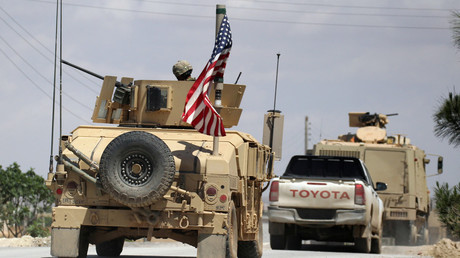'Hope they come to their senses': Tehran summit ends with call for Idlib terrorists to lay down arms
especiales

Turkey seems to have prevailed during tripartite talks with Russia and Iran, convincing the other parties that a major offensive in Syria's Idlib governorate would not be the wisest move at the moment.
The situation in Syria was discussed in Tehran on Friday by Turkey's Recep Tayyip Erdogan, Russia's Vladimir Putin and Iran's Hassan Rouhani as part of the so-called "Astana process." The leaders of Iran and Turkey disagreed on what action should be taken in Syria's Idlib, the last major stronghold of armed groups in the country, which is dominated by hardcore jihadists.
All three nations agree that the threat of radical Islamists in Syria must be eliminated, but differ as to how this should be achieved. Rouhani advocated a strong-arm approach, claiming it would secure an end to major hostilities in the seven-year-old conflict.
"We have to realize that only the destruction of the terrorists, a military victory against them, can ensure stability and peace in the future in Syria and not only in that country," he said.
Erdogan reiterated his government's concern over the potential death toll of an offensive in highly populated Idlib, where an estimated 3.5 million people are currently living. Turkey, which borders the Syrian governorate, is also objecting to a major operation there because it would likely cause a major exodus of refugees across the border, with extremists potentially sneaking in with refugees.
"[The refugees] would have no other way to go but Turkey. But we have already accepted 3.5 million refugees. Turkey cannot take in more," said President Erdogan.
"Our goal is to resolve the situation in Idlib according to the spirit of the agreements we made in Astana," Erdogan added, warning that "mistakes in Idlib may derail the political process in Syria."
The Iranian president eventually agreed that civilians living in Idlib should not become victims of an anti-terrorist effort.
Call to end violence
At Erdogan's suggestion, the final communique of the summit was amended to include a call for all armed groups in Idlib to lay down arms and seek a political transition in the country. Putin and Rouhani agreed, which may indicate that a major offensive in Idlib is not likely to be launched in the immediate future, unless some major development happens on the ground. The Russian president remarked that the call is addressed to all armed groups in the Syrian province, including UN-designated terrorist groups.
"Let us hope that the members of the terrorist organizations would have enough sense to stop resistance and lay down weapons," he said.
"Our agreements on Syria were always based on a premise that we are seeking to ensure peace between all belligerents, but kept the terrorist organizations bracketed out," he remarked.
@Khaaasteh While final statement of #TehranSummit was about to be passed, Erdogan suddenly questioned the text and called for inclusion of "ceasefire" in the statement. The presidents are now negotiating and bargaining live on TV !
As he was arguing against an offensive in Idlib, Erdogan acknowledged that armed groups controlling the governorate pose a credible threat, including to Russian military personnel stationed at Khmeimim Airbase. He suggested that regular drone attacks on the Russian military site should be stopped by pushing those launching them out of range.
During the summit, Rouhani and Erdogan were united in their criticism of the presence of US troops in Syria. The Iranian president repeatedly stressed that foreign influence was a major factor in escalating the war in Syria, and called on the US to withdraw the troops that it has illegally deployed in Syria. Erdogan reiterated Ankara's objection to the support that the US gives Kurdish militias in northern Syria, which are perceived as a major security threat by the Turkish government.
Return of refugees key to resolving violence
Putin's remarks on the situation in Syria tilted towards humanitarian aspects and the necessity to reconstruct the country. He said that many people who had fled violence in Syria to other nations may now return to their homes.
"Conditions have been made in Syria to take in up to a million of refugees. The government has provided security guarantees to all returnees, assuring that they would not be subjected to discrimination, including in terms of property rights," he said.
The Russian president argued that, if as many Syrians as possible get a chance to return to peaceful lives, it would give an impetus to a political resolution of the conflict between the Syrian government and the so-called "moderate opposition." Erdogan disagreed with Putin, saying that the return of refugees to Syria would only be possible after a new constitution is agreed and adopted, and an election held to form a new government.
Russia, Turkey and Iran are seeking to end violence in Syria and facilitate negotiations between its government and opposition groups, which agree to cease hostilities and seek a political transition for their country. The desired outcome is a peaceful Syria under a government that properly represents all its minorities and is in control of all its territory. The final resolution of the conflict, which was greatly complicated by foreign interference and the rise of jihadist groups, is expected to be negotiated in Geneva under the aegis of the UN.















Add new comment